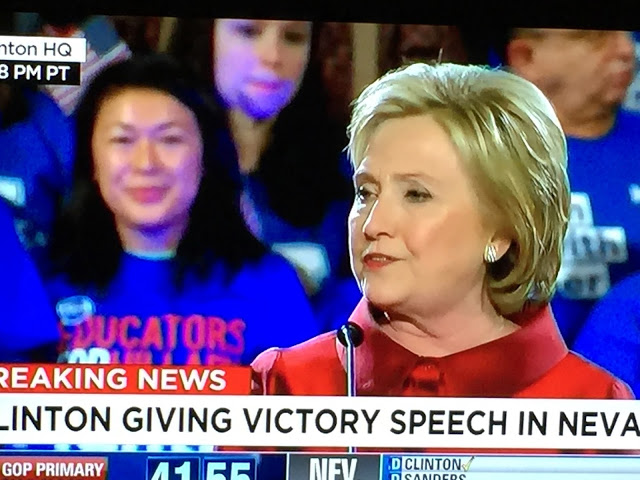
By Ed Diokno
The Nevada caucus was a real test of the candidates’ ability to woo minority voters, who in that state made up almost 40 percent of the electorate. Asian American voters approach almost 10 percent of Nevada’s registered voters.
In the tight race for the Democratic nomination, every vote could spell the difference between a victory or a loss. Both campaigns for Sen. Bernie Sanders and former Sec. of State Hillary Clinton placed a heavy emphasis on outreach to Asian American voters, the fastest growing segment of the population.
RELATED: Asian Americans hard to find in New Hampshire & Iowa
All the campaign workers – even those from Sanders’ camp – agreed that the Clinton campaign, with a robust staff in the state for months, has had the most sustained outreach with a series of Asian American themed events: dinners celebrating a Filipino holiday, Asian American-themed phone banks and canvasses and making use of ethnic media to reach out to AAPI communities.
RELATED: AAPI voters could be the margin of victory in Nevada
Clinton last month kicked off her national outreach to Asian Americans with an event in Los Angeles’ heavily Asian eastern suburbs with Olympic figure skater Michelle Kwan. At a recent caucus training for Asian American Democrats in Las Vegas, the Clinton campaign’s national director of Asian American and Pacific Islander outreach, Lisa Changaveja, mentioned that Clinton’s longtime aide Huma Abedin and campaign finance chairman Dennis Cheng are both Asian American.
Changaveja argued that the former secretary of state was uniquely positioned to appeal to Asian Americans. “She’s been in Thailand more than I have, and my mother lives in Thailand,” Changaveja quipped.
Ameli, the Clinton campaign volunteer, sees Clinton as a natural fit. “Asians are very family-oriented and want everything for their families, and I believe everything Hillary is for, is for our families,” she said.
RELATED: Clinton reaches out to AAPI voters
America’s Opportunity Fund (AOF) ran an ad in support of Hillary Clinton for President directed towards the Filipino community, a key voting constituency within the AAPI community and paid phone banking targeting the overall AAPI community at large.
“Filipino Americans are the largest sub ethnic group of the AAPI community and they’re the fastest growing population in Clark County,” said AOF Executive Director Madalene Mielke. “Hillary recognizes the significance of the AAPI constituency in this “First of the West” primary state.”
After Latinos, Filipno Americans make up the largest minority group in Clark County, home of Las Vegas and where 70 percent of the state’s people live.
“People like to think of us as one monolithic group, but, of course, we’re not,” said Changadveja, the Clinton campaign’s national outreach specialist to the AAPI communities. “There’s so many languages, so many communities, so many cultures, so what we’ve tried to do is identify leaders in each particular subgroup community to kind of step up and kind of lead the charge.”
Ray Buenaventura, a city council member from Daly City, CA was in Las Vegas to help get out the vote. He Tweeted out these images:
Huge turnout of #AAPIforHillary. Clearly aapi were the margin of victory. News reports more than double #aapi voters pic.twitter.com/z6Pu2aVLZN
— Ray Buenaventura (@raybesq) February 20, 2016
Guess who was the largest contingent at Hillary HQNevada making calls on the day before the Caucas #AAPIforHillary pic.twitter.com/JelHnRtVJE
— Ray Buenaventura (@raybesq) February 20, 2016
One of the problems of reaching out to immigrants is that the state’s caucus system is new to them and requires them to be active participants beyond simply casting a ballot behind a curtain.
“From the country we come from, we do not have caucus elections,” said Marjie Gonzalez, who is from the Philippines and in charge of Asian outreach for Democrats in Nevada.
“The common attitude is, you know, we’ll just wait in November and we’ll vote for our candidate in November. But the candidate that you like may not reach November.”
Overall, the turnout for the caucus may present a worry for the Democrats. Only 80,000 Democrats voiced their preference compared to 2012 when the presidential elections drew 120,000 Democrats. Of course, this was just a primary and the vote in November is expected to attract more attention and participation.
In the meantime, Republican and Democratic campaign workers will be focusing in registering the eligible voters from Nevada’s large immigrant population.
Republicans will hold their caucus on Feb. 23 in Nevada, where frontrunner Donald Trump owns a casino and hotel in Las Vegas.
The Democratic candidates will face off again in South Carolina on Feb. 27 where Clinton holds a sizable lead, especially among African American voters.
(Ed Diokno writes a blog :Views From The Edge: news and analysis from an Asian American perspective.)
(AsAmNews is an all-volunteer effort of dedicated staff and interns. You can show your support by liking our Facebook page at www.facebook.com/asamnews, following us on Twitter and sharing our stories.)


